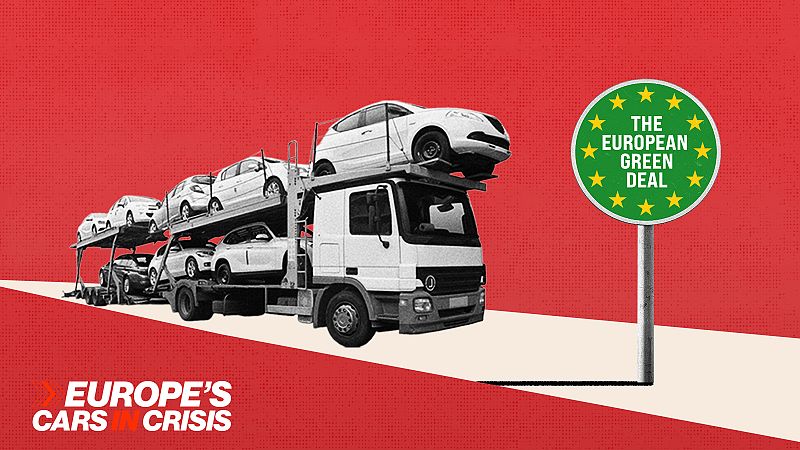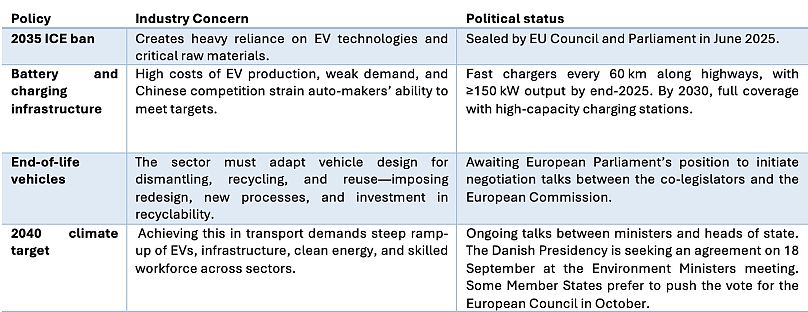The European Green Deal and the car industry - a fight to the death?

Since its inception the EU Green Deal has had a mixed reception from Europe's car industry, which faces mandatory shifts to slash CO2 emissions, phasing out internal combustion engine (ICE) cars by 2035, investing in electrification and taking up financial responsibility for end-of-life vehicles.
Impending negotiations over the 2040 climate target, proposing to reduce emissions by 90%, are pushing the sector to ramp-up production on electric vehicles amid buyer uncertainty.
With a century-old tradition of producing vehicles with ICE engines, the EU automotive sector has been caught between a rock and a hard place, trying to adapt to the green transition — prioritising the production of clean vehicles and ensuring sustainable use of car parts and materials — while struggling to keep its nose ahead of the global competition, with powerhouses like Germany already feeling the heat.
CO2 emissions
On emissions, contentious rules in Brussels and in the capitals currently foresee a CO2 reduction target of 55% by 2030 and 100% by 2035, compared to 2021.
MEP Jens Gieseke (Germany/EPP), who sits on both the environmental and industry committees in the European Parliament, defends his European People’s Party's (EPP) opposition to the blanket ban on ICEs proposed by the Commission.
“We proposed to open up the legislation by recognising the role of CO2-neutral fuels, opening up a pathway for decarbonised ICEs to become part of the future technology mix,” Gieseke told Euronews. “That way, a fair, open and market-based competition between different propulsion technologies would have been possible.”
The German lawmaker said that the market, and not the legislator, should decide what technology is most cost efficient and best suited for emission reduction.
Gieseke is backed by his colleague Peter Liese, the EPP’s environmental policy spokesperson, who advocated for “technological openness” shortly after the EU elections in June 2024, where the Greens lost great influence inside the Parliament.
Interviewed by Euronews at the time, Liese confirmed the EPP’s desire to change swathes of the Green Deal, particularly the law on slashing CO2 emissions in cars, claiming European carmakers weren’t ready to meet stricter limits on exhaust-pipe carbon emissions limits by 2025.
Electrify or die?
Following China’s emergence as a leading global exporter, Europe's market for battery electric vehicles has been flooded with brands such as BYD, while domestic manufacturers have been slow to embrace battery EVs.
Delays and disruptions in flagship battery projects, such as the bankruptcy of Swedish battery plant Northvolt earlier this year, have cast doubt on Europe’s ability to build a competitive, homegrown value chain.
Recent EV sales across the EU have fallen short of earlier expectations, according to the Fraunhofer Institute, which has estimated a slight decline not only in the overall vehicle market (-4 %), but also in battery EV (-6 %) and plug-in hybrid models (-5%) from 2023 to 2024.
In June 2025, Chinese EV brands reached their highest-ever market share in Europe at 5.4%, according to a report by market research firm Jato Dynamics, and continued strong performance by July 2025, reaching 5.1%.
While EU tariffs on Chinese cars may give some room for European carmakers to compete, it’s not enough according to industry representatives, who blame the lack of sufficient infrastructure, such as charging points, for putting consumers off purchasing EVs.
Lawmaker Gieseke regretted as “catastrophic” the loss of 51,000 jobs in the German automotive sector within one year as a result of the transition to electrification: “That is nearly 7% of the total jobs in the German automotive industry. And it shows clearly that focusing on full electrification is the wrong approach.”
“A revision of the CO2 performance standards is deeply necessary,” Gieseke said.
The main lobbying group for the auto industry, the European Automobile Manufacturers' Association (ACEA) has repeatedly expressed apprehension over the lack of crucial conditions the sector is missing to reach the necessary boost in production and adoption of zero-emission vehicles.
These include “Charging and hydrogen refilling infrastructure, as well as a competitive manufacturing environment, affordable green energy, purchase and tax incentives, and a secure supply of raw materials, hydrogen and batteries,” the group's board has stated.
While ACEA maintains its commitment towards the Green Deal’s goals and green mobility, flagging the hundreds of electric models launched and billions invested, it calls on a “pragmatic path forward” in line with the industrial, economic and geopolitical scenario.
“That means recalibrating targets, enabling the right conditions, like infrastructure and affordable energy,” an ACEA spokesperson told Euronews. “It also means ensuring consistency and simplification in legislation. For the Green Deal to succeed, we need rules that are coherent, streamlined, ad aligned across Europe, rather than fragmented or constantly changing.”
Echoes from Germany
A similar view has echoed from Germany after the February elections that replaced the socialist Olaf Scholz with the conservative Friedrich Merz.
With the new chancellor, Germany’s direction shifted to a potential narrowing of focus on climate policies, with the conservative CDU/CSU party's rise suggesting a shift towards business deregulation and tax cuts and a slower pace for the energy transition.
Defending the EU’s automotive powerhouse, Chancellor Merz warned the EU executive in July against potentially strict CO2 regulations for company vehicles. Merz emphasised that the automotive industry is one of Europe's core sectors: "We must not allow it to be destroyed by narrowing down to specific technologies."
Last year, Italy presented a joint proposal backed by Austria, Bulgaria, Czechia, Poland, Romania and Slovakia, calling for a planned review of CO2 emissions standards to be brought forward. But the law was sealed by the co-legislators — Council and Parliament — on 17 June.
Will Friday's meeting between CEOs from the car industry and Commission President Ursula von der Leyen see an opportunity for the EU executive to offer flexibility on rules demanding the end of diesel and petrol vehicles within the coming ten years?
Health and medical professionals from across Europe penned a letter to Wopke Hoekstra, European Commissioner for Climate, Net Zero and Clean Growth on Monday, raising the alarm on the danger of rolling back the ban on diesel and petrol cars.
The signatories noted the risks to human health of nitrogen dioxide (NO2) and fine particulate matter (PM2.5) from burning fossil fuels in road transport.
"This target [2035 ICE ban] is not only vital for reducing greenhouse gas emissions — it is essential for reducing toxic air pollutants and safeguarding public health,” ran the statement. “Delaying or weakening this goal would put lives at risk, prolong Europe's dependency on fossil fuels, and undermine our collective right to clean air.”
The struggle between the auto sector and those lobbying to keep the targets intact is set to define the next few months.
The Green Deal and Cars - a guide
Today


